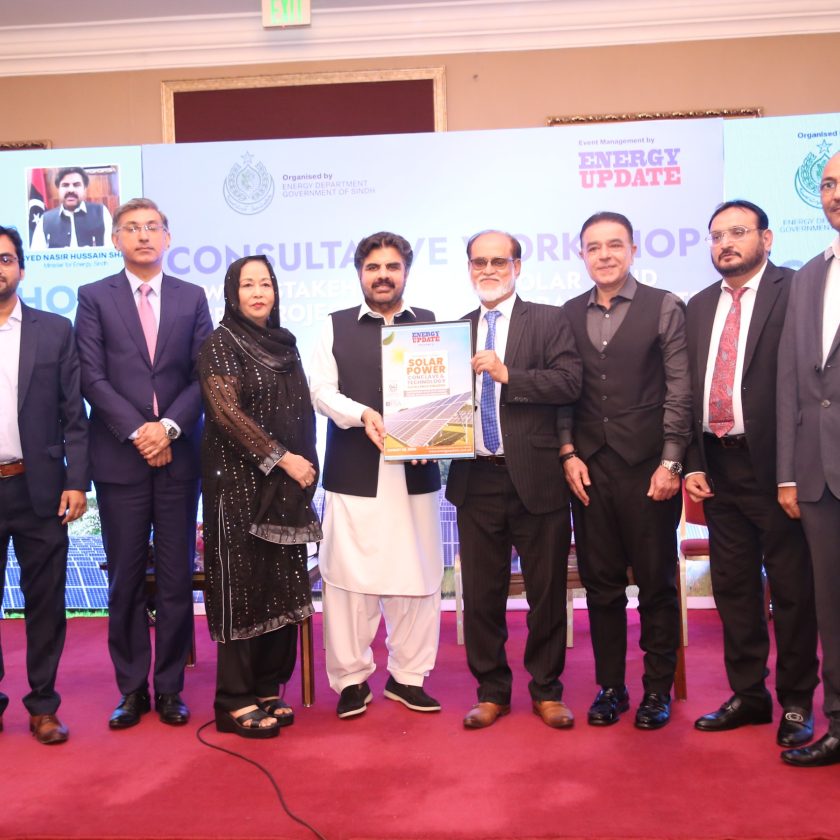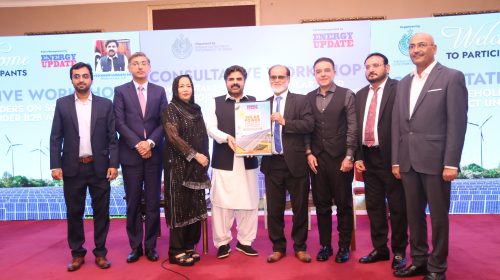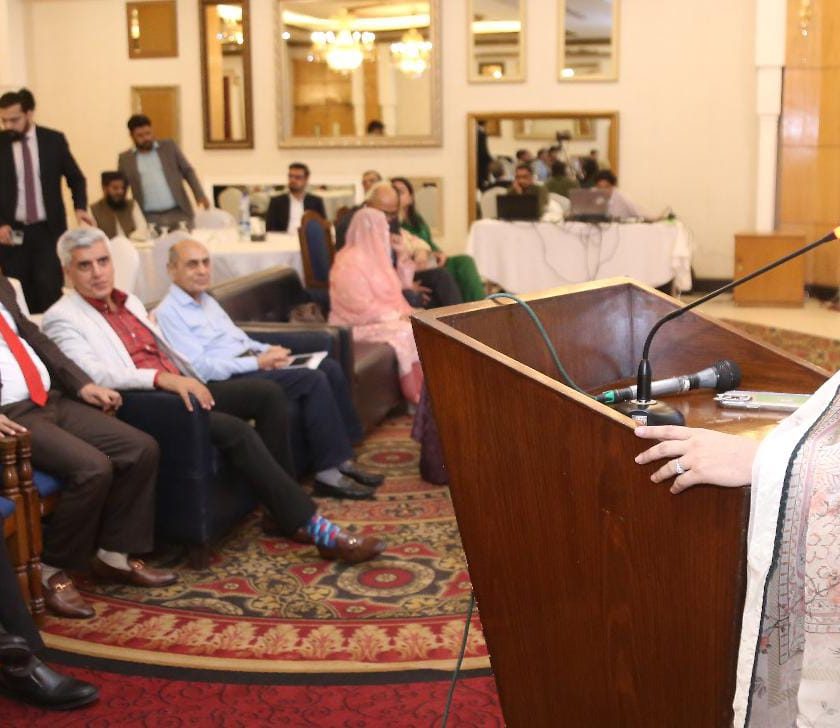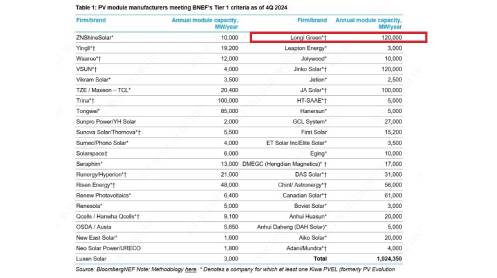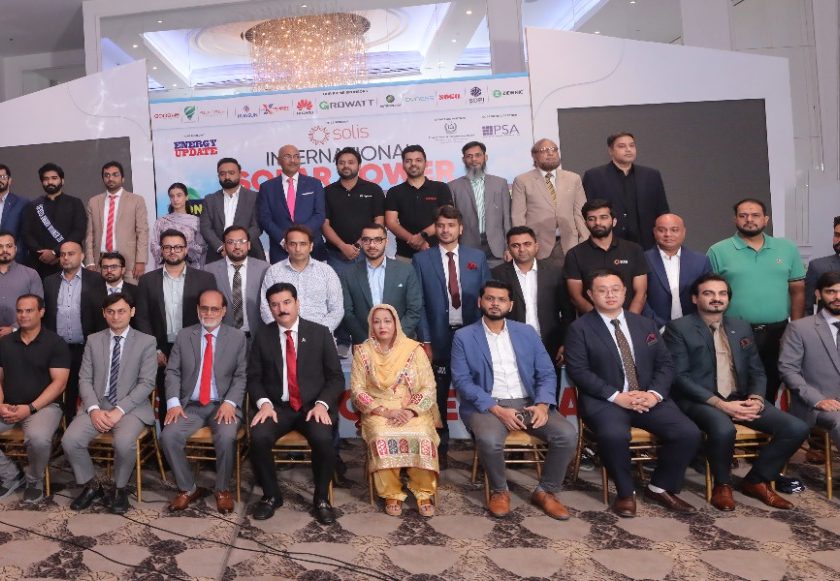The Government of Sindh for the very first time held an interactive session, participated by the relevant stakeholders, to showcase the massive potential of the province to produce clean electricity by combining wind and solar renewable sources that are abundantly available in the provincial territory.
The Sindh government’s Energy Department teamed up with the Energy Update to present to the concerned stakeholders its proposed plan for the wind-solar hybrid project under a B2B arrangement with greater participation of the private sector.
The Sindh government initially aimed to generate 350 Megawatts of clean electricity under the hybrid arrangement with 250 MWs based on wind power and solar energy generating 100 MWs. The hybrid project is expected to generate 940 GW of clean power per year.
The proposed B2B arrangement stands for transmitting clean electricity produced by private hybrid projects to businesses and industries in urban areas through the transmission network of Sindh Transmission & Dispatch Company (STDC).
The audience at the workshop was informed that the per unit cost of clean electricity produced by the hybrid generation project would be around Rs 18.45 as this consumer-end tariff would further be decreased with gradual scaling up of the project’s generation capacity.
he B2B arrangements for clean energy projects stand for providing liberty to the businesses and industries to choose among more than one distributor of electricity by opting for the electricity provider with the lowest tariff. Such an arrangement will ultimately lead to the scenario where the existing monopoly of three power distribution companies in Sindh, two in the public sector and one privatized, will come to an end under the regime of a proposed provincial power sector regulator. The consumers in the province would one day get a choice similar to the case of the telecom sector where the subscribers could switch to any cellular phone network with much ease offering the lowest call rates.
Senior clean energy expert, Iran Ahmed, who conducted the workshop, informed the audience that Pakistan could generate about 3300 GW of clean electricity based on its abundant wind and solar energy sources. He said the solar and wind energy projects so far installed in the country had a generation capacity of 45 GW.
He said that so far 36 renewable projects installed in the wind corridor of Sindh had been producing 1845 MW of clean electricity. He emphasized that the government should decrease its footprint in the energy sector as public-private partnerships should be the preferred way to launch new power projects.
Sindh Minister for Energy and Planning & Development, Syed Nasir Hussain Shah, was the chief guest at the workshop.
Speaking on the occasion, the Sindh Energy Minister said the electricity prices for domestic and industrial consumers in the province would significantly be reduced with the Sindh Electric Power Regulatory Authority (SEPRA) likely becoming functional by the end of next month to take over tariff determination affairs in Sindh.
The Energy Minister hoped that the federal government would fully support SEPRA becoming functional in the province to provide due economic relief to the consumers by reducing power tariffs.
He said the solar parks being established under the public-private partnership and their renewable electricity supplied through the STDC were two key pillars of the plan of the Sindh government being executed to reduce the consumer-end tariff.
He said the solar parks were being built in Sindh to deliver on the poll manifesto promise of the Pakistan Peoples Party of providing 300 units of free electricity to destitute consumers.
He told the audience at the workshop that the Sindh government would soon start distribution of 200,000 solar home systems to off-grid homes under a World Bank-assisted drive to promote clean energy usage in the province.
Shah said the Sindh government had been working hard to ensure early implementation of the plan contained in the new provincial budget to provide 500,000 solar panels to off-grid homes in faraway areas.
He informed the audience that the capacity payments to independent power producers would remain fully controlled under the incoming proposed SEPRA regime in Sindh to ensure consumer tariffs shouldn’t unduly increase.
Shah told the audience that the provincial government had the utmost resolve to energise at the earliest 2.6 million off-grid homes using the massive renewable power production potential of the province.
He hoped that the federal authorities would fully assist Sindh in implementing these energy plans envisioned in line with the 18th Constitutional Amendment.
Sindh Alternative Energy Director, Mehfooz Qazi, told the audience that industries and businesses would likely become the main beneficiaries of the proposed hybrid generation project under the B2B arrangement as they would get access to the cheapest electricity produced in the province based on the indigenous energy sources.
He said that EV charging stations would also be established in the urban areas after the execution of the hybrid generation project.
He said the Sindh government would conduct third-party studies and validation to firm up its hybrid clean power generation plan that would massively benefit industrial consumers in the province.
He said the transmission and distribution systems of STDC would be fully utilised to evacuate clean electricity produced by hybrid wind-solar projects to industrial consumers in the province under the B2B arrangements.
MD Thar Coal Energy Board, Tariq Ali Shah, shed light on the proposed new electricity policy of Sindh while saying that the Constitution fully supported the provinces to establish their own power sector regulators and transmission and distribution companies as being done in Sindh.
He said the SEPRA would be established as per the autonomy granted to the province under the 18th Constitutional Amendment to end the monopoly of the existing distribution companies and extend maximum relief to the consumers.
Naeem Qureshi of Energy Update expressed hope that the consultative workshop would help harness the massive clean energy potential of Sindh.
Several concerned representatives of energy sector companies, academics, and researchers attended the workshop and gave their views on the proposed B2B arrangement for the upcoming wind-solar hybrid power project under a public-private partnership regime.
Sindh Energy Secretary Mussadiq Ahmed Khan, CEO STDC Saleem Shaikh, and other senior officials of the provincial Energy Department also attended the workshop.
Recommendations by participants of the consultative workshop on Sindh’s Solar Wind hybrid project:
-The output from the proposed wind-solar hybrid project should maximally benefit the province’s low and middle-income power consumers who don’t have the financial capacity to pay the inflated power bills every month.
-The government should minimize its footprint in the energy sector and one major step in this direction should be accelerated implementation of solar wind hybrid power projects under B2B arrangements with maximum participation of the private sector.
-The private energy sector entities should be involved in all the stages of wind solar hybrid projects under B2B arrangements including power generation, transmission, and distribution functions.
-Proper research, surveys, and studies involving credible third parties from the private sector should be conducted to ensure viability and maximum mileage from the proposed wind-solar hybrid project in Sindh.
-The provinces should set up their own regulatory authorities, transmission, distribution, and grid companies under the provincial autonomy enshrined in the 18th Constitutional Amendment to accelerate such B2B arrangements in the energy sector for the greater good of the concerned consumers.
-Sindh should be regarded as a role model for setting up energy sector companies by other provinces in line with the 18th Constitutional Amendment.
-NEPRA-related laws should be duly amended to allow commercial and industrial consumers in Karachi to purchase electricity for their businesses from multiple buyers at a time.
-Solar wind hybrid projects under B2B arrangements should be a way forward towards the desired goal of ending K-Electric’s monopoly on the distribution side.
-EV charging stations should be established in Karachi based on the clean electricity generated by wind-solar hybrid projects.
-Awareness sessions and seminars should be held in the universities to make people aware of the Sindh government’s efforts to harness Sindh’s massive clean energy potential.
-The government should facilitate setting up more clean energy projects to harness the vast renewable energy potential of Sindh’s wind corridor whose output should be supplied to the industries and businesses in Karachi by the private sector under B2B arrangements.
-The Sindh government should conduct more consultative sessions with the concerned stakeholders in the clean energy sector to accelerate building renewable power projects in Sindh.






